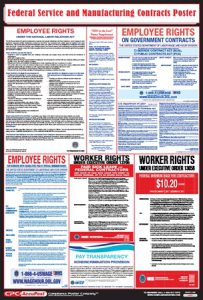 Most federal contractors and subcontractors are responsible employers that are vetted by the government prior to winning federal contracts. As an added measure, in 2016 President Obama signed the Fair Pay and Safe Workplaces Executive Order 13673 (EO), which would have required government contractors and subcontractors to report labor law violations against them to federal agencies as part of the federal contract pre-award process. It was set to take effect October 25, 2016. This week, President Trump revoked the Fair Pay and Safe Workplaces EO preserving the status quo in federal contracting applications for the time being.
Most federal contractors and subcontractors are responsible employers that are vetted by the government prior to winning federal contracts. As an added measure, in 2016 President Obama signed the Fair Pay and Safe Workplaces Executive Order 13673 (EO), which would have required government contractors and subcontractors to report labor law violations against them to federal agencies as part of the federal contract pre-award process. It was set to take effect October 25, 2016. This week, President Trump revoked the Fair Pay and Safe Workplaces EO preserving the status quo in federal contracting applications for the time being.
Disclosure of Labor Law Violations
Already, federal agencies by law must contract only with “responsible” sources. The EO specified the labor law violations that federal contracting officers had to consider as a part of the determination of contractor “responsibility.” Specifically, the EO would have required reporting violations of 14 federal labor laws and equivalent state laws, including wage and hour violations, family and medical leave violations, civil rights violations, OSHA violations and OSHA-approved State Plan violations. It quickly became known as the “blacklisting rule.”
The EO was intended to protect workers and taxpayers by making sure that government contracts would not go to companies that violate federal labor laws. Ostensibly, labor law compliant contractors are more likely to have workplace practices that enhance productivity and increase the likelihood of timely, predictable, and satisfactory delivery of goods and services to the federal government. However, the EO was criticized by industry and employer groups because it would have included reporting minor violations, non-final decisions, unproven complaints and settled violations.
Paycheck Transparency
The EO also contained a paycheck transparency provision that went into effect January 1, 2017. It required covered contractors and subcontractors to provide workers with a wage statement detailing the individual’s hours worked, overtime hours, pay, and any additions made to or deductions made from pay. It also required contractors and subcontractors to inform individuals in writing if the individual was being treated as an independent contractor, and not an employee.
Take-away – Status Quo
This week’s revocation of the Fair Pay and Safe Workplaces EO means that federal contractors will not be required to report alleged labor law violations to federal agencies as part of the bid process. The decision to revoke the EO won’t change current federal contracting procedures. Most of the EO was never implemented. A Texas federal court had already issued an injunction enjoining the reporting regulations last October. However, the paycheck provisions of the EO, which were not enjoined, are also revoked by President Trump’s Executive Order. Paycheck disclosures are typically required by state law.

